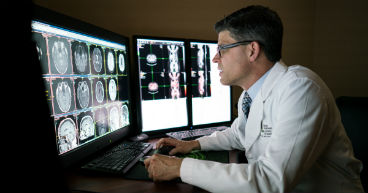
Cancer risks and concerns don’t go away when you reach your 70s and 80s, so you may be surprised when your doctor suggests stopping your regular cancer screenings when you reach a certain age.
Yes, cancer is the leading cause of death for American adults between the ages of 45 and 84. And for those 85 and older, it is second only to heart disease. But the National Cancer Institute says most new cancer cases are diagnosed in people between the ages of 55 and 74. For those in older age groups, the benefits of cancer screenings may need to be weighed against the potential side effects of the test, and how likely interventions are to extend life, especially for those who may be dealing with other serious health issues.
If you’re at average risk of cancer, the U.S. Preventive Services Task Force and/ other medical organizations only recommend:
- Colorectal cancer screenings through age 75
- Breast cancer screenings through age 74
- Cervical cancer screenings through age 65
- Prostate cancer screenings, if performed at all, stopping at age 69
- Lung cancer screenings, for heavy smokers, through age 79
Most cancer screenings aren’t recommended if a person has a life expectancy of less than 10 years, since the cancers may take at least that long to develop.
Why stop regular screenings at a certain age? The reasons include:
- People are more susceptible to harm from tests as they age. In a colonoscopy, for example, the colon lining may tear or sedation may adversely affect the patient. The prep medicine may cause problems of its own, and the frequent trips to the bathroom may lead to a fall and injury.
- Older adults may have other major health issues. A person coping with heart problems, diabetes, dementia or other serious conditions may be better off focusing on improvements in those areas.
- Cancer screenings may produce false positives. A routine screening with no underlying symptoms may erroneously show the presence of cancer, creating unnecessary anxiety and potentially leading to risky procedures.
- More research is needed. Cancer screening recommendations for other age groups are based on past research. That research may not have been conducted on older age groups, meaning medical organizations may not have the information they need on the efficacy of such screenings to make those recommendations.
But stopping cancer screening because of age does not mean you should stop paying attention to your health. Making healthy lifestyle choices that may help reduce your cancer risk—getting restful sleep, quitting tobacco products, staying active and eating a well-balanced diet—may be even more important for older adults.
“It is important to convey that a decision to stop cancer screening does not translate into decreased health care. Rather, discussions can focus on health promotion strategies that are most likely to benefit patients in the more immediate future, such as exercise and immunizations,” a 2016 report on screenings of older adults in the American Family Physician Journal says.
Also, discontinuing regular cancer screenings does not mean you should stop regular self-exams, such as checking for lumps or skin lesions, or notifying your doctor when a suspicious symptom develops.
“Patients should always be aware of a change in their health condition and alert their primary care practitioner of any change,” says Anthony Perre, MD, FACP, Vice Chief of Staff at Cancer Treatment Centers of America® (CTCA), Philadelphia. “These changes may include shortness of breath, pain, bleeding, unexplained weight loss or any new symptom.”
If you’re 65 or older and you haven’t already, talk with your doctor about future cancer screenings. If you’re in good physical shape with no serious ailments, your doctor may want to continue some screenings longer than recommended. You may have had previous results that indicate continued monitoring is warranted. Or maybe you and your doctor think the extra screenings no longer make sense.
“It truly is an individualized discussion with the patient to determine if the risk and harms of screening are outweighed by the potential benefit of identifying a cancer early enough to make a positive difference in their life expectancy,” Dr. Perre says. “This important discussion is best accomplished in a framework of a relationship in which the patient feels comfortable and confident in partnering with his or her primary care practitioner.”


